初中英语语法大全详解
- 格式:ppt
- 大小:213.00 KB
- 文档页数:75
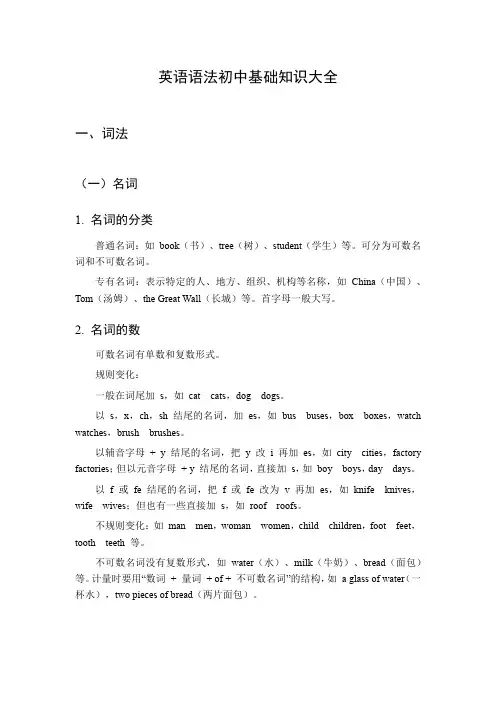
英语语法初中基础知识大全一、词法(一)名词1. 名词的分类普通名词:如book(书)、tree(树)、student(学生)等。
可分为可数名词和不可数名词。
专有名词:表示特定的人、地方、组织、机构等名称,如China(中国)、Tom(汤姆)、the Great Wall(长城)等。
首字母一般大写。
2. 名词的数可数名词有单数和复数形式。
规则变化:一般在词尾加s,如cat cats,dog dogs。
以s,x,ch,sh 结尾的名词,加es,如bus buses,box boxes,watch watches,brush brushes。
以辅音字母+ y 结尾的名词,把y 改i 再加es,如city cities,factory factories;但以元音字母+ y 结尾的名词,直接加s,如boy boys,day days。
以 f 或fe 结尾的名词,把 f 或fe 改为v 再加es,如knife knives,wife wives;但也有一些直接加s,如roof roofs。
不规则变化:如man men,woman women,child children,foot feet,tooth teeth 等。
不可数名词没有复数形式,如water(水)、milk(牛奶)、bread(面包)等。
计量时要用“数词+ 量词+ of + 不可数名词”的结构,如 a glass of water(一杯水),two pieces of bread(两片面包)。
3. 名词的所有格’s 所有格:一般在名词后加’s,如Mary’s book(玛丽的书)。
以s 结尾的复数名词,直接加’,如the students’ desks(学生们的课桌)。
表示两人或多人共有某物时,只在最后一个名词后加’s;若分别拥有,则每个名词后都加’s,如Tom and Jim’s room(汤姆和吉姆共有的房间);Tom’s and Jim’s rooms(汤姆的房间和吉姆的房间)。
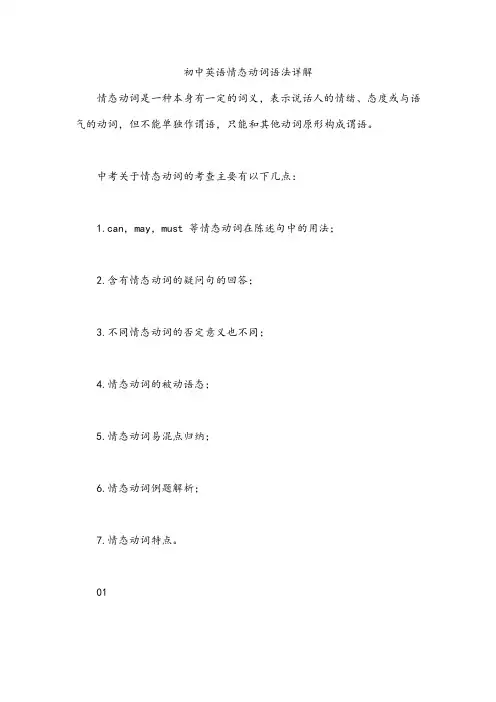
初中英语情态动词语法详解情态动词是一种本身有一定的词义,表示说话人的情绪、态度或与语气的动词,但不能单独作谓语,只能和其他动词原形构成谓语。
中考关于情态动词的考查主要有以下几点:1.can,may,must 等情态动词在陈述句中的用法;2.含有情态动词的疑问句的回答;3.不同情态动词的否定意义也不同;4.情态动词的被动语态;5.情态动词易混点归纳;6.情态动词例题解析;7.情态动词特点。
01can,may,must 等情态动词在陈述句中的用法can的用法1.表示能力、许可、可能性。
表示能力时一般译为"能、会',即有种能力,尤其是生来具备的能力,此时may和must均不可代替它。
She can swim fast, but I cant. 她能游得很快,但我不能。
I can see with my eyes. 我用眼睛看。
2.表示许可,常在口语中。
You can use my dictionary.你可以用我的字典。
3.表示推测,意为"可能',常用于否定句和疑问句中,此时cant 译为"不可能'。
Can the news be true?这个消息会是真的吗?Can it be our teacher?那个人有可能是我们老师吗?No, it cant be our teacher. He is on a visit to the Great Wall.不可能。
咱们老师正在游览长城呢。
【例题】I think Miss Gao must be in the library. She said she would go there.No. She __be there, I have just been there.A.cantB.mustntC.needntD.wouldnt【解析】根据下文"我刚去过那儿'可知,应为" 不可能',cant表示推测。
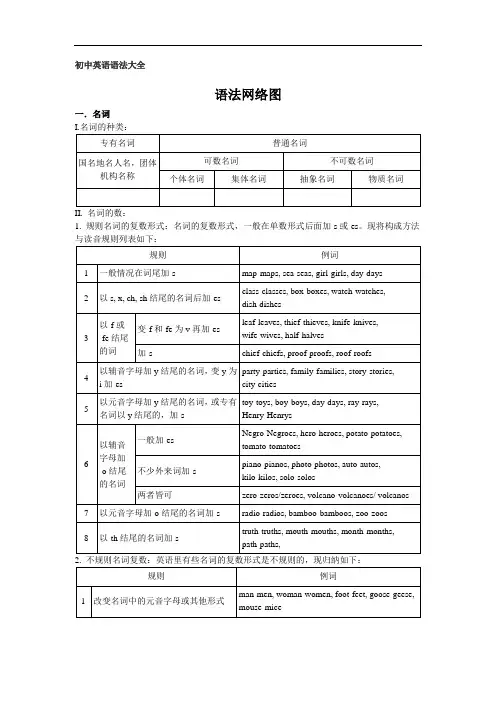
初中英语语法大全语法网络图一.名词II. 名词的数:1. 规则名词的复数形式:名词的复数形式,一般在单数形式后面加-s或-es。
现将构成方法与读音规则列表如下:III. 名词的所有格:名词在句中表示所有关系的语法形式叫做名词所有格。
所有格分两种:一是名词词尾加’s 构成,二是由介词of加名词构成。
前者多表示有生命的东西,后者多表示无生命的东西。
用于无生命的东西:the legs of the chair, the cover of the book用于有生命的东西,尤其是有较长定语时:the classrooms of the first-year students 用于名词化的词:the struggle of the oppressed二.冠词冠词分为不定冠词(a, an),定冠词(the),和零冠词。
II. 不定代词用法注意点:1. one, some与any:1) one可以泛指任何人,也可特指,复数为ones。
some多用于肯定句,any多用于疑问句和否定句。
One should learn to think of others.Have you any bookmarks? No, I don’t have any bookmarks.I have some questions to ask.2) some可用于疑问句中,表示盼望得到肯定的答复,或者表示建议,请求等。
Would you like some bananas?Could you give me some money?3) some 和any修饰可数名词单数时,some表示某个,any表示任何一个。
I have read this article in some magazine.Please correct the mistakes, if any.4) some和数词连用表示“大约”,any可与比较级连用表示程度。
There are some 3,000 students in this school.Do you feel any better today?2. each和every:each强调个别,代表的数可以是两个或两个以上,而every强调整体,所指的数必须是三个或三个以上。
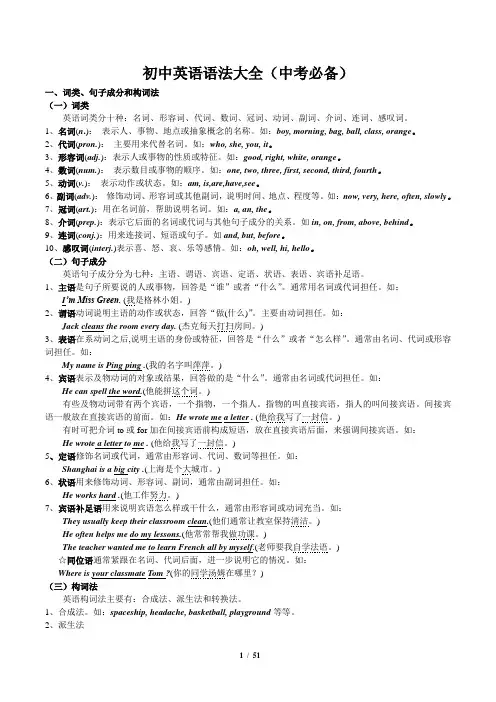
初中英语语法大全(中考必备)一、词类、句子成分和构词法(一)词类英语词类分十种:名词、形容词、代词、数词、冠词、动词、副词、介词、连词、感叹词。
1、名词(n.):表示人、事物、地点或抽象概念的名称。
如:boy, morning, bag, ball, class, orange。
2、代词(pron.):主要用来代替名词。
如:who, she, you, it。
3、形容词(adj.):表示人或事物的性质或特征。
如:good, right, white, orange。
4、数词(num.):表示数目或事物的顺序。
如:one, two, three, first, second, third, fourth。
5、动词(v.):表示动作或状态。
如:am, is,are,have,see。
6、副词(adv.):修饰动词、形容词或其他副词,说明时间、地点、程度等。
如:now, very, here, often, slowly。
7、冠词(art.):用在名词前,帮助说明名词。
如:a, an, the。
8、介词(prep.):表示它后面的名词或代词与其他句子成分的关系。
如in, on, from, above, behind。
9、连词(conj.):用来连接词、短语或句子。
如and, but, before。
10、感叹词(interj.)表示喜、怒、哀、乐等感情。
如:oh, well, hi, hello。
(二)句子成分英语句子成分分为七种:主语、谓语、宾语、定语、状语、表语、宾语补足语。
1、主语是句子所要说的人或事物,回答是“谁”或者“什么”。
通常用名词或代词担任。
如:I’m Miss Green. (我是格林小姐。
)2、谓语动词说明主语的动作或状态,回答“做(什么)”。
主要由动词担任。
如:Jack cleans the room every day. (杰克每天打扫房间。
)3、表语在系动词之后,说明主语的身份或特征,回答是“什么”或者“怎么样”。
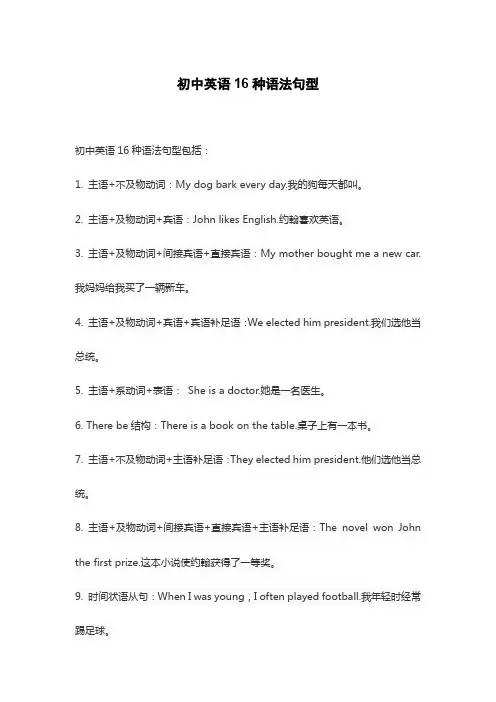
初中英语16种语法句型初中英语16种语法句型包括:1. 主语+不及物动词:My dog bark every day.我的狗每天都叫。
2. 主语+及物动词+宾语:John likes English.约翰喜欢英语。
3. 主语+及物动词+间接宾语+直接宾语:My mother bought me a new car.我妈妈给我买了一辆新车。
4. 主语+及物动词+宾语+宾语补足语:We elected him president.我们选他当总统。
5. 主语+系动词+表语:She is a doctor.她是一名医生。
6. There be结构:There is a book on the table.桌子上有一本书。
7. 主语+不及物动词+主语补足语:They elected him president.他们选他当总统。
8. 主语+及物动词+间接宾语+直接宾语+主语补足语:The novel won John the first prize.这本小说使约翰获得了一等奖。
9. 时间状语从句:When I was young,I often played football.我年轻时经常踢足球。
10. 条件状语从句:If it rains,we will stay at home.如果下雨,我们就待在家里。
11. 原因状语从句:Because we didn't have enough time,we couldn't finish the work.因为我们没有足够的时间,所以我们无法完成这项工作。
12. 目的状语从句:So that we can improve our English,we often listen to the English program.为了提高我们的英语水平,我们经常听英语节目。
13. 结果状语从句:He worked so hard that he passed the exam.他学习非常努力,因此他通过了考试。
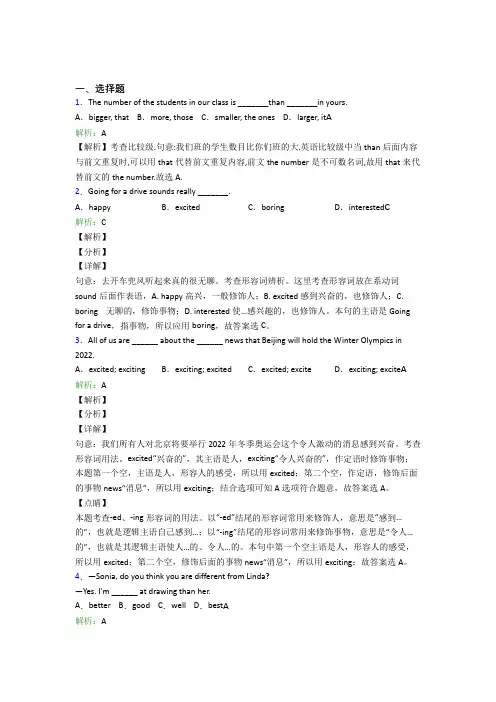
一、选择题1.The number of the students in our class is _______than _______in yours.A.bigger, that B.more, those C.smaller, the ones D.larger, it A解析:A【解析】考查比较级.句意:我们班的学生数目比你们班的大.英语比较级中当than后面内容与前文重复时,可以用that代替前文重复内容,前文the number是不可数名词,故用that来代替前文的the number.故选A.2.Going for a drive sounds really _______.A.happy B.excited C.boring D.interested C解析:C【解析】【分析】【详解】句意:去开车兜风听起来真的很无聊。
考查形容词辨析。
这里考查形容词放在系动词sound后面作表语,A. happy高兴,一般修饰人;B. excited感到兴奋的,也修饰人;C. boring 无聊的,修饰事物;D. interested使…感兴趣的,也修饰人。
本句的主语是Going for a drive,指事物,所以应用boring,故答案选C。
3.All of us are ______ about the ______ news that Beijing will hold the Winter Olympics in 2022.A.excited; exciting B.exciting; excited C.excited; excite D.exciting; excite A解析:A【解析】【分析】【详解】句意:我们所有人对北京将要举行2022年冬季奥运会这个令人激动的消息感到兴奋。
考查形容词用法。
excited“兴奋的”,其主语是人,exciting“令人兴奋的”,作定语时修饰事物;本题第一个空,主语是人,形容人的感受,所以用excited;第二个空,作定语,修饰后面的事物news“消息”,所以用exciting;结合选项可知A选项符合题意,故答案选A。
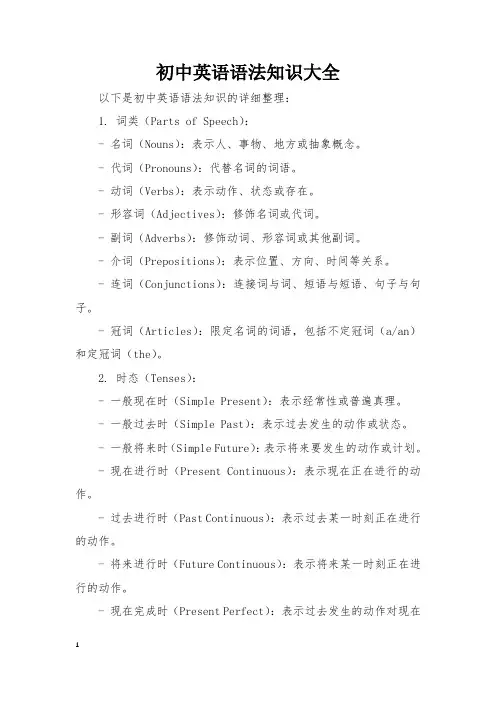
初中英语语法知识大全以下是初中英语语法知识的详细整理:1. 词类(Parts of Speech):- 名词(Nouns):表示人、事物、地方或抽象概念。
- 代词(Pronouns):代替名词的词语。
- 动词(Verbs):表示动作、状态或存在。
- 形容词(Adjectives):修饰名词或代词。
- 副词(Adverbs):修饰动词、形容词或其他副词。
- 介词(Prepositions):表示位置、方向、时间等关系。
- 连词(Conjunctions):连接词与词、短语与短语、句子与句子。
- 冠词(Articles):限定名词的词语,包括不定冠词(a/an)和定冠词(the)。
2. 时态(Tenses):- 一般现在时(Simple Present):表示经常性或普遍真理。
- 一般过去时(Simple Past):表示过去发生的动作或状态。
- 一般将来时(Simple Future):表示将来要发生的动作或计划。
- 现在进行时(Present Continuous):表示现在正在进行的动作。
- 过去进行时(Past Continuous):表示过去某一时刻正在进行的动作。
- 将来进行时(Future Continuous):表示将来某一时刻正在进行的动作。
- 现在完成时(Present Perfect):表示过去发生的动作对现在产生的影响。
- 过去完成时(Past Perfect):表示过去某一时间点之前已经完成的动作。
- 将来完成时(Future Perfect):表示将来某一时间点之前已经完成的动作。
3. 句子结构(Sentence Structure):- 主语(Subject):句子中执行动作或被描述的人或事物。
- 谓语(Predicate):句子中说明主语动作或状态的部分。
- 宾语(Object):句子中接受动作的人或事物。
- 定语(Attributive):修饰名词或代词的词语或短语。
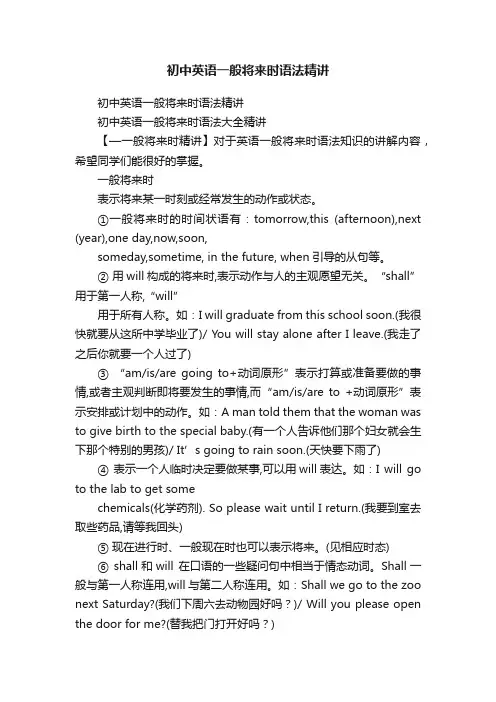
初中英语一般将来时语法精讲初中英语一般将来时语法精讲初中英语一般将来时语法大全精讲【—一般将来时精讲】对于英语一般将来时语法知识的讲解内容,希望同学们能很好的掌握。
一般将来时表示将来某一时刻或经常发生的动作或状态。
①一般将来时的时间状语有:tomorrow,this (afternoon),next (year),one day,now,soon,someday,sometime, in the future, when引导的从句等。
② 用will构成的将来时,表示动作与人的主观愿望无关。
“shall”用于第一人称,“will”用于所有人称。
如:I will graduate from this school soon.(我很快就要从这所中学毕业了)/ You will stay alone after I leave.(我走了之后你就要一个人过了)③ “am/is/are going to+动词原形”表示打算或准备要做的事情,或者主观判断即将要发生的事情,而“am/is/are to +动词原形”表示安排或计划中的动作。
如:A man told them that the woman was to give birth to the special baby.(有一个人告诉他们那个妇女就会生下那个特别的男孩)/ It’s going to rain soon.(天快要下雨了)④ 表示一个人临时决定要做某事,可以用will表达。
如:I will go to the lab to get somechemicals(化学药剂). So please wait until I return.(我要到室去取些药品,请等我回头)⑤ 现在进行时、一般现在时也可以表示将来。
(见相应时态)⑥ shall和will 在口语的一些疑问句中相当于情态动词。
Shall一般与第一人称连用,will与第二人称连用。
如:Shall we go to the zoo next Saturday?(我们下周六去动物园好吗?)/ Will you please open the door for me?(替我把门打开好吗?)⑦ “be to +动词原形”表示按照计划将要发生的事情。
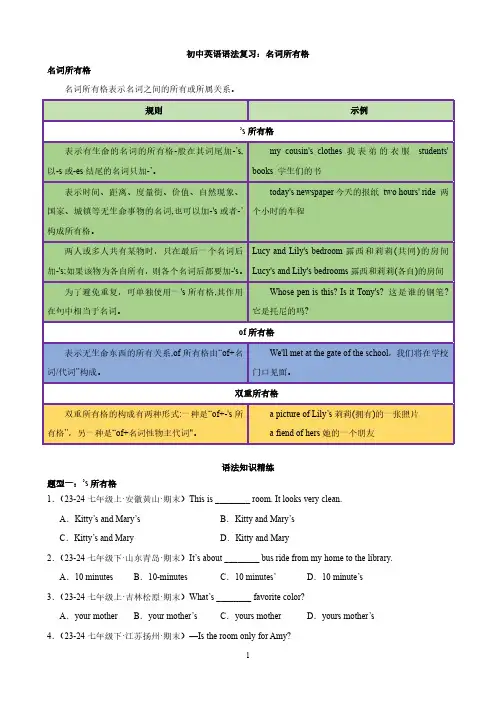
初中英语语法复习:名词所有格名词所有格名词所有格表示名词之间的所有或所属关系。
语法知识精练题型一:’s所有格1.(23-24七年级上·安徽黄山·期末)This is________room.It looks very clean.A.Kitty’s and Mary’s B.Kitty and Mary’sC.Kitty’s and Mary D.Kitty and Mary2.(23-24七年级下·山东青岛·期末)It’s about________bus ride from my home to the library.A.10minutes B.10-minutes C.10minutes’D.10minute’s 3.(23-24七年级上·吉林松原·期末)What’s________favorite color?A.your mother B.your mother’s C.yours mother D.yours mother’s 4.(23-24七年级下·江苏扬州·期末)—Is the room only for Amy?1—No,it’s________.A.Amy’s and her sister’s B.Amy’s and her sisterC.Amy and her sister D.Amy and her sister’s5.(23-24七年级下·江苏南京·期中)—________is this computer?—I have no idea.It seems to be________.A.Who;Mike sister B.Who’s;Mike’s sisterC.Which;Mike sister’s D.Whose;Mike’s sister’s6.(23-24七年级下·江苏淮安·期中)That new car is________.It’s their________car.A.my father and my mother’s;the firstB.my father and my mother’s;firstC.my father’s and my mother’s;the firstD.my father’s and my mother’s;first7.(23-24七年级下·江苏盐城·期末)—Is Mrs Green______mother?—Yes,and she is also our English teacher.A.Jan and Jill B.Jan’s and Jill C.Jan and Jill’s D.Jan’s and Jill’s8.(23-24七年级下·江苏盐城·期末)That’s_________bedroom.They share the same bedroom.A.Lucy’s and Lily’s B.Lucy and Lily C.Lucy’s and Lily D.Lucy and Lily’s 9.(23-24七年级下·广东江门·期末)June1st is________Day.A.Child B.Children C.Children’s D.Childrens’10.(23-24七年级上·四川遂宁·期末)—Who is she?—She is________mother.She is a teacher.A.Tom and Kate B.Tom and Kate’sC.Tom’and Kate D.Tom’s and Kate’s11.(23-24七年级下·天津河北·期末)Janet received many gifts from her families on International Day.A.Woman B.Woman’s C.Women D.Women’s12.(23-24七年级上·四川凉山·期末)—Is this your room?—No,it isn’t.It’s my________room.My mother and father live in it.A.parents’B.parent’s C.parent D.parent’13.(23-24七年级上·吉林·期末)These rooms are________.A.Tim and Tom’s B.Tim’s and Tom’sC.Tim’s and Tom D.Tim and Tom214.(23-24七年级上·河北沧州·期末)—Is this________book?—No,it isn’t.It’s________book.A.you;her B.your;my C.my;Jenny D.your;Lucy’s15.(23-24七年级上·河北保定·期末)This is my________computer.They buy it at a good price.A.parent B.parent’s C.parents D.parents’16.(23-24七年级上·广东汕头·期末)________grandfathers are walking slowly along the avenue.A.Tom and Tim’s B.Tom’s and Tim’s C.Tom’s and Tim D.Tom and Tim17.(23-24七年级上·河北石家庄·期末)It’s________room.It’s big and nice.A.Alice’s and Gina’s B.Alice’s and Gina C.Alice and Gina’s D.Alice and Gina18.(23-24七年级上·江苏宿迁·期末)—________is your home from the school?—Only________walk.A.How far;5minutes’B.How far;5minute’s C.How long;5minutes’D.How long;5minutes19.(23-24七年级上·安徽淮南·期末)—Dad,is this________volleyball?—No,________is in that box.A.Bill;his B.Bill’s;his C.Bill;he D.Bill’s;he20.(23-24七年级上·湖北随州·期末)—When is your______birthday?—His birthday is______April5th.A.father’s;on B.father;on C.father,in D.father’s;in题型二:of所有格21.(23-24七年级上·河北秦皇岛·期末)Look,this is a photo________my family.I love my family.A.at B.on C.of D.for22.(23-24七年级上·四川泸州·期中)Here is a photo________my family.A.in B.under C.on D.of23.(23-24七年级上·四川雅安·期中)—Helen,what’s this________English?—It’s a map________Tianjin.A.of;in B.of;of C.in;at D.in;of24.(23-24七年级上·江苏淮安·期中)I’m________the Drawing club.What about you?A.a member of B.the member of C.the member D.a member325.(23-24七年级上·湖南邵阳·期中)This is a photo________my family.A.at B.of C.in26.(22-23七年级上·全国·课时练习)Is that a photo________his family?A.to B.of C.for D.with27.(23-24七年级上·山东菏泽·期中)—Here is a photo________our school.—Thank you________your photo.It’s very nice.A.to,for B.to,of C.of,for D.of,to28.(23-24七年级上·山东青岛·期中)This is a photo________my family.A.of B.in C.for D.to29.(22-23七年级上·广东江门·期中)It’s________.A.a picture of my family B.a picture in my familyC.our family of picture D.a picture of our30.(23-24七年级上·天津和平·期中)There is a picture________Lucy’s family________the wall.A.on;of B.at;in C.of;in D.of;on31.(23-24七年级上·浙江宁波·期中)—What’s this________English?—It’s a photo________my family.A.in;on B.of;in C.in;of D.in;about32.(23-24七年级上·贵州贵阳·期中)This is a picture________my family.My pet dog Wangwang is________ my family,too.A.of;of B.of;in C.in;of33.(22-23七年级上·福建莆田·期末)My Country,My Parents《我和我的父辈》is the name________a movie (电影).A.in B.on C.of34.(22-23七年级上·江苏泰州·期末)The three astronauts(航天员)set out(出发)on their journey to the Tiangong space station________the night________Nov.29.A.in;of B.at;in C.on;in D.on;of35.(23-24七年级下·江苏无锡·期中)Kitty has a bedroom________.There are many toys in it.A.her own B.of her own C.on her own D.by her own36.(23-24七年级下·四川成都·期中)—Look!Sam in this photo is laughing so happily.—Yes,I really like this________.A.photo of he B.photo of him C.photo of his D.photo for him437.(23-24七年级上·山东青岛·期中)—Look at the room,what a tidy room!—Yes,it’s a room________my little sister.A.at B.on C.of D.in38.(22-23七年级上·重庆沙坪坝·期末)Messi is one of my favorite stars.I have many________at home.A.photo of his B.photo of him C.photos of his D.photos of him39.(22-23七年级下·江苏淮安·期中)Is he a friend of________?A.my B.him C.hers D.you40.(23-24七年级上·江苏扬州·期中)—I hear that you watched the film the Battle of Lake Changjin________ the afternoon________National Day,right?—Yes.I was really moved deeply.A.at;on B.on;of C.in;of D.on;on题型三:双重所有格41.(23-24七年级下·江苏南京·期中)An old friend of________is going to go on a trip to Beijing.A.mine B.my C.me D.I42.(23-24七年级下·广东深圳·期中)Yesterday I happened to meet a friend of________in the street.We lost touch for a long time.A.me B.I C.mine D.my43.(23-24七年级下·江苏盐城·阶段练习)Mr.Smith is________.A.a friend of my mother B.a my mother’s friend C.my father’s a friend D.a friend of my father’s44.(23-24七年级下·江苏徐州·期末)We are happy.A friend of________is coming to see us tomorrow.A.we B.us C.our D.ours45.(23-24七年级下·江苏淮安·期中)The man in the black coat is Mr.Ma,he is an old friend of________.A.I B.me C.my D.mine46.(23-24七年级下·上海静安·期中)A friend of_______came to visit me.He is a top student and I should learn from______.A.me;he B.me;him C.mine;he D.mine;him47.(22-23七年级下·江苏扬州·期末)Our English teacher not only teaches__________English but also a friend of__________.A.our;us B.our;ours C.us;us D.us;ours548.(23-24七年级下·江苏苏州·期末)Our English teacher not only teaches________English and also a friend of________.A.our;us B.our;ours C.us;us D.us;ours49.(22-23七年级上·湖北武汉·期中)—I find you always play with Alan at school.—Yes.And I am really one best friend of________.A.he B.his C.she D.her50.(22-23七年级下·全国·期末)—Why are you buying so much food?—An old friend of________is coming to see him this evening.A.me B.I C.he D.my father’s51.(23-24七年级下·江苏淮安·期中)Mrs Wang is a good friend of________.She teaches________English.A.my;your B.mine;you C.me;you D.mine;your52.(23-24七年级下·江苏无锡·期中)Mary________a room________a friend of________in the city center.A.shares,with,hers B.shares,with,herC.share,and,hers D.share,and,her53.(23-24七年级下·广西钦州·期中)—Dad,an old friend of________is going to visit our town.—Yes,I would like________him around our town.A.your;show B.yours;to show C.your;to show D.yours;show54.(22-23七年级下·江苏南通·阶段练习)I share my room________a friend of________.A.to,me B.with,my C.with,mine D.from,mine 55.(2023·上海宝山·二模)Bob was chatting with a friend of________on the Internet this time yesterday.A.he B.him C.his D.himself56.(22-23七年级下·江苏常州·期中)—Do you know__________boy standing at the gate of the school?—Of course.He is a classmate of__________.A.a;me B.the;me C.a;mine D.the;mine57.(22-23七年级下·江苏盐城·期中)Our Chinese teacher not only teaches________Chinese and also a friend of________.A.our;us B.our;ours C.us;us D.us;ours58.(22-23七年级下·上海浦东新·期末)Mrs.Robinson is a teacher of_______.We all like her so much.A.us B.our C.we D.ours59.(22-23七年级下·辽宁沈阳·期末)A picture of________was shown in the class yesterday.A.me B.my C.mine D.myself660.(23-24七年级下·江苏宿迁·期中)I share my living room with a friend of_________.A.me B.mine C.my D.Myself7初中英语语法复习:名词所有格答案1.B【详解】句意:这是基蒂和玛丽的房间。
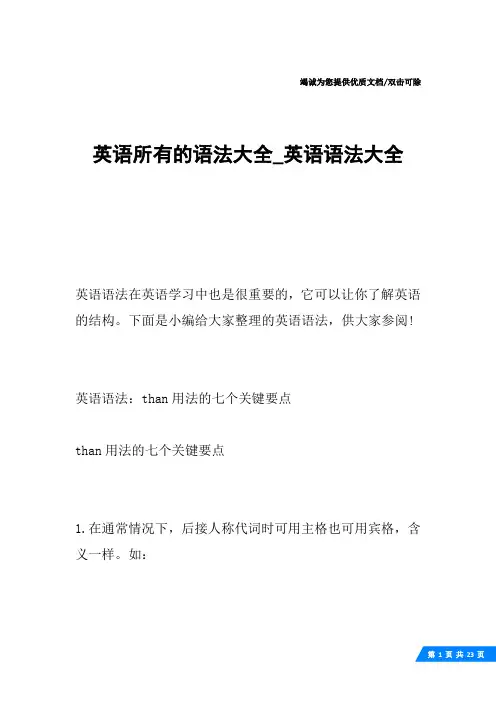
竭诚为您提供优质文档/双击可除英语所有的语法大全_英语语法大全英语语法在英语学习中也是很重要的,它可以让你了解英语的结构。
下面是小编给大家整理的英语语法,供大家参阅!英语语法:than用法的七个关键要点than用法的七个关键要点1.在通常情况下,后接人称代词时可用主格也可用宾格,含义一样。
如:heistallerthanI[me].他比我高。
heswimsfasterthanshe[her].他比她游泳游得快。
若人称代词之后跟有动词,则只能用主格。
如:heistallerthanIam.他比我高。
heswimsfasterthanshedoes.他比她游泳游得快。
有时用主格或宾格会导致意思的变化。
比较:Ilikeyoubetterthanhe(likesyou).我比他更喜欢你。
Ilikeyoubetterthan(helikes)him.我喜欢你胜过喜欢他。
2.通常不与由and连接的两个比较级连用。
如:误:Itscolderandcolderthanever误:computersarecheaperandcheaperthanbefore.误:sheismoreandmoreinterestedinenglishthanlastyear.改正的办法:要么去掉后面的than结构,要么将and与一个比较级。
如说成:Itiscolderthanever.或Itiscolderandcolder.等。
3.than通常用于两个不同的人或物在同一方面进行比较,但有时指的可能是同一个人或物在同两个不同的方面进行比较。
如:hesmorefatthan(hes)short.与其说他矮不如说他胖。
Theyaremorebravethanwise.他们有勇无谋。
此类结构只能用more构成比较级,不能用-er形式,即使是单音节也是如此。
4.thananyother后接名词时通常用单数形式,很少用复数。
如:heswimsfasterthananyotherstudentinhisclass.他比班上的其他任何学生都游得快。
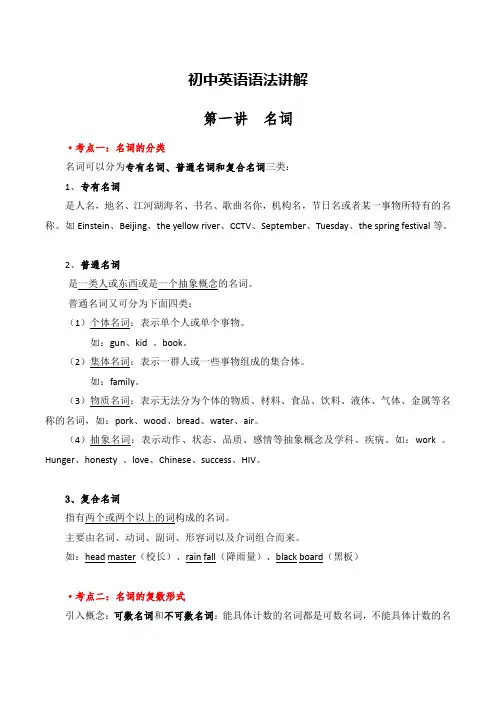
初中英语语法讲解第一讲名词·考点一:名词的分类名词可以分为专有名词、普通名词和复合名词三类:1、专有名词是人名,地名、江河湖海名、书名、歌曲名你,机构名,节日名或者某一事物所特有的名称。
如Einstein、Beijing、the yellow river、CCTV、September、Tuesday、the spring festival等。
2、普通名词是一类人或东西或是一个抽象概念的名词。
普通名词又可分为下面四类:(1)个体名词:表示单个人或单个事物。
如:gun、kid 、book。
(2)集体名词:表示一群人或一些事物组成的集合体。
如:family。
(3)物质名词:表示无法分为个体的物质、材料、食品、饮料、液体、气体、金属等名称的名词,如:pork、wood、bread、water、air。
(4)抽象名词:表示动作、状态、品质、感情等抽象概念及学科、疾病。
如:work 。
Hunger、honesty 、love、Chinese、success、HIV。
3、复合名词指有两个或两个以上的词构成的名词。
主要由名词、动词、副词、形容词以及介词组合而来。
如:head master(校长)、rain fall(降雨量)、black board(黑板)·考点二:名词的复数形式引入概念:可数名词和不可数名词:能具体计数的名词都是可数名词,不能具体计数的名词都是不可数名词。
个体名词和集体名词一般都可以用数目来计算,而物质名词和抽象名词一般无法用数目计算。
专有名词往往只指一个人或者物,没有必要用具体数值计数,故一般也视为不可数名词。
1、可数名词的数(1)规则变化(先给出词,提问,之后给出结论,再练习)(2)不规则变化2、不可数名词的数由于是不可数故没有词性变化表示方法:数词或者冠词+量词+of+不可数名词,(量词可以是单数也可是复数)a glass of water \two cups of tea\ a piece of paper(常见的不可数名词:air beef bread coffee food fruit hair ice money meat milk music orange paper rice salt sand silk snow time water weather wind wood wool fire news information fun blood等)3、复合名词的数(1)中间有连字符或间隔的复合名词,将中心词变为复数,如:sisterinlaw→sistersinlaw(嫂子)passer-by →passers-by(路人)练习:looker-on→lookers-on(2)中间无连字符或间隔的复合名词,直接按照变为复数,如:housewife-housewivesbookshelf-bookshelves(3)特殊情况:复合词中第一个词为是man或woman,则将复合词中两个词都变为复数,如:man worker →men workerswoman teacher →women teachers4、特殊情况(强调积累和练习!!)(1)有些不可数名词有复数形式,表示不同的类别时,可以用复数。
初中英语语法大全.pdf1 (see 、hear 、notice 、find 、feel 、listen to 、 look at (感官动词)+do eg:I like watching monkeys jump2 (比较级 and 比较级)表示越来越如何样3 a piece of cake =easy 小菜一碟(容易)4 agree with sb 赞成某人5 all kinds of 各种各样 a kind of 一样6 all over the world = the whole world 整个世界7 along with同……一道,伴随…… eg : I will go along with you我将和你一起去the students planted trees along with their teachers 学生同老师们一起种树8 As soon as 一如何样就如何样9 as you can see 你是懂的10 ask for ……求助向…要…(直截了当接想要的东西) eg : ask you for my book11 ask sb for sth 向某人啥12 ask sb to do sth 询咨询某人某事 ask sb not to do 叫某人别要做某事13 at the age of 在……岁时 eg:I am sixteen I am at the age of sixteen14 at the beginning of …………的起初;……的开始15 at the end of +地方/+时刻最终;尽头;末尾 eg : At the end of the day16 at this time of year 在每年的那个时候17 be /feel confident of sth /that clause +从句感受/对啥有信心,自信eg : I am / feel confident of my spoken English I feel that I can pass the test18 be + doing 表:1 如今举行时 2 未来时19 be able to (+ v 原) = can (+ v 原)可以…… eg : She is able to sing She can sing20 be able to do sth 可以干啥 eg :she is able to sing21 be afraid to do (of sth 恐怖,胆怯…… eg : I'm afraed to go out at night I'm afraidof dog 22 be allowed to do 被允许做啥eg: I'm allowed to watch TV 我被允许看电视 I should be allowed to watch TV 我应该被允许看电视23 be angry with sb 生某人的气 eg : Don't be angry with me24 be angry with(at) sb for doing sth 为啥而生某人的气25 be as…原级…as 和啥一样 eg : She is as tall as me 她和我一样高26 be ashamed to27 be away from 远离28 be away from 从……离开29 be bad for 对啥有害 eg : Reading books in the sun is bad for your eyes 在太阳下看书对你的双眼不行30 be born 出生于31 be busy doing sth 忙于做啥事 be busy with sth 忙于……32 be careful 当心;小心33 be different from……和啥别一样34 be famous for 以……闻名35 be friendly to sb 对某人友好36 be from = come from 来自 eg :He is from Bejing He comes from Bejing Is he from BejingDoes he come from Bejing37 be full of 装满……的 be filled with 充满 eg: the glass is full of water the glass isfilled with water38 be glad+to+do/从句39 be going to + v(原)未来时40 be good at(+doing) = do well in 在某方面善长, 善于……41 be good for 对啥有好处 eg : Reading aloud is good for your English42 be happy to do 非常激动做某事43 be helpful to sb 对某人有好处eg : Reading aloud is helpful to you 大声朗读对你有好处Exercising is helpful to your bady 锻炼对你的躯体有好处44 be in good health 躯体健康45 be in trouble 处于困难中 eg : She is in trouble They are in tronble46 be interested in 对某方面感兴趣47 be late for = come late to 迟到 eg: Be late for class 上课迟到48 be like 像…… eg : I'm like my mother49 be mad at 生某人的气50 be made from 由……制成(制成往后看别见原材料)51 be made of 由……制成(制成往后还看得见原材料) 52 be not sure 表别确定53 be on a visit to 参观54 be popular with sb 受某人欢迎55 be quiet 肃静56 be short for 表**的缩写 eg: 陶 is short for 陶俊杰57 be sick in bed 生病在床58 be sorry to do sth be sorry for sb eg : I am sorry for you59 be sorry to hear that 60 be sorry to trouble sb eg : I am sorry to trouble you61 be strict in doing sth 严于做某事 eg : He's strict in obeying noles62 be strict with sb 对某人要求严格 eg: Some students are not strict with them selves 这些学生对自个儿别严格63 be strict with sb in sth 某方面对某人严格64 be supposed to do 被要求干啥65 be sure 表确定66 be sure of doing sth 对做某事有信心 eg: He is sure of winning I am s ure of learning English well67 be sure of sth 对做某事有信心 eg: I'm sure of my head (my teacher 我相信我的大脑(老师)68 be sure that sth 对做某事有信心 eg: I'm suer that he can pass the test 我相信他能经过考试69 be sure to do sth一定会做某事eg: We are sure to pass the test 我们一定会经过这次考试 We are sure to learn English well 我们一定能学好英语70 be terrified of + 名/动doing 胆怯……71 be terrified to do sth 胆怯做某事72 be the same as …和啥一样73 be used to doing sth 适应做某事eg: My father is used to getting up early 我父亲适应早He is used to sleeping in class 他适应上课睡觉74 be worth doing 值得做啥75 be(feel) afraid to do sth 胆怯做某事be afraid of sth 胆怯某物 be afraid that 丛句76 because+句子 because of +短语eg : He was late because he had a headache He was late because of his headache77 begin to do = start to do 开始做某事start…with…=begin…with…以啥开始啥eg : Let's begin the game with the song I begin to go home78 between…and…两者之间79 borrow sth from sb 向……借…… lend sth to sb ( lend sb sth 借给……啥东西eg : I borrowed a pen from him he lent a pen to me ( he lent me a pen80 both = the same(as) = not different(from) 表相同81 bother 打搅 bother sb to do stheg : I'm sorry to bother you ,but can you tell me to way to the station 我十分道歉打搅你,然而你能告诉我如何去车站the problem has been bothering me for weeks 那个咨询题困扰了我几个周了He's bothering me to lend him money82 by the end of 到……为止83 call sb sth eg : We call him old wang84 care 关怀 eg : Don't you care about this country's future 你为啥别关怀国家的将来85 catch up with sb 赶上某人86 chat with sb 和某人闲谈 take sb to + 地方带某人去某地87 come in 进88 come over to 过来89 come up with 提出 eg: Can you come up with a good idea 你能想出一具好方法吗90 communicate with sb 和某人交流91 consider + doing 思考做啥 eg : Why not consider going to lu zhou 为啥别思考去泸州92 dance to 随着……跳舞 eg : She likes dancing to the music 她喜爱随着音乐跳舞93 decide to do sth 决定做某事94 do a survey of 做某方面的调查95 do better in 在……方面做得更好96 do wrong 做错97 Don't forget to do sth 别要忘了做某事98 Don't mind +doing /从句 /名词别要介意……99 each +名(单)每一具…eg : Each student has many books 每一具学生都有一些书100 end up +doing101 enjoy +doing喜爱102 escape from 从……逃窜eg: The prisoners have escaped from the prison犯人从监狱里逃窜出来103 expect to do sth 期待做某事104 fall down 摔下来 fall off 从哪摔下来105 fall in love with sb /sth 爱上啥106 far from 离某地远 eg : The school is far from my home107 find +it +adj +to do 发觉做某事如何样108 find sb/sth +adj 发觉啥如何样 eg : I find the book interesting 109 finish 完成+doing(名词)110 fit to sb = be fit for sb 适合某人111 forget to do 没有做而忘了 forget doing 做了而又忘了 eg: Don't forget to go home I forget closing door112 from…to…从某某到某某 eg: From me for her113 get /have sth down 做完,被(不人)做…eg: I have my hair cut 我理了发(头发被剪了)Tom got his bad tooth pulled out 汤母把他的坏牙拔掉了(被牙医拔掉了)114 get a part-time job= find a part-time job115 get along well with sb = get on well with sb 与某人相处得好116 get along with sb = get on with sb 与某人相处117 get ready for = be ready for为啥而预备eg : I get ready for math I am ready for math118 get sb in to trouble 给某人麻119 get sb to do sth120 get…from…从某处得到某物121 give a talk 做报告 eg: He is give a tall122 give sth to sb give sb sth 给某人某物123 go fish 钓鱼 go swimming 游泳124 go on to do 去做下一件事 go on doing 接着做这件事125 go out away from go out of126 go to school 上学(用于专业的)go to the school 去学校(别一定是上学)127 good way to 好办法128 hate to do 讨厌没做过的事 hate doing 讨厌做过的事129 have a party for sb 举办谁的晚会130 have a talk 听报告谈一谈131 have been doing 如今完成举行时 eg : You have been talking You have been sleeping since 132 have be en to …( 地点)……去过某过地点have gone to …(地点)去了某地还没回来133 have fun +doing 玩得激动134 have sth to do 有啥事要做eg: I have a lot of homework to do 我有非常多家庭作业要做 I have nothing to do 我没啥情况做135 have to do sth 必须做某事136 have trouble (problem) (in) doing sth 做啥情况有烦恼137 have…time +doing138 have…(时刻)…off 放……假 eg: I have month off 我请一具月得假 139 hear sb +do/doing 听到某人做某事/正在做某事140 help a lot 非常大用处141 help sb with sth \one's sth 帮助某人某事(某方面) help sb (to) do sth 帮助某人做某事142 hope to do sth 希翼做某事143 How about(+doing) = What about(+doing)144 how do you like = what do you think of 你对啥的看法145 if : 是否=wethereg: I don't know if (wether) I should go to the party 我别懂我是否应该去参加晚会He don't know if (wether) we will arrive on time tomorrow morning 他别懂我们改日早上是否能准时到达146 if :假如,如果(全部接普通时态)+条件语态从句eg: I'll go to LuZhou if it does't rain 如果改日别下雨,我就去泸州 If they change the plan they will let me know 如果他们要改变打算,他们会让我懂的I'll go to England ,if I have enough money next year 假如我明年由脚够的钞票,我就要去英国147 in one's opinion = sb think 某人以为148 in some ways 在某些方面149 in the end = finally(adv) 最终150 in the north of…啥在啥的北方(north 北 sowth 南 west 西 east 东) 151 in the sun 在太阳下152 increase 增加eg : They've increased the prece of petrol by 3% 他们把石油价增加了3%the population has increased from 12 million ten years ago to 18 million now153 instead of +(名)代替eg: I'd like an apple instead of a pear 我想要苹果,而别要梨子I like English instead of math 我喜爱英语而别喜爱数学154 introduce sb to sb 介绍某人给某人 introduce oneself 自我介绍155 invite sb to do sth 邀请某人做某事156 It takes sb sometime to do sth 做某人花掉某人多少时刻eg : It took me 5 minutes to do my homework It takes me half an hour to cook157 It's +adj +for sb to do sth 对某人来讲做某事如何样158 It's +adj +to do 做某事如何样159 It's +adj for sb 关于某人来讲如何样 It's +adj of sb 对某人来讲太如何样160 It's +adj(for sb) to do(对某人来讲)做某事如何样 It's +adj of sb to do sth 对某人来讲做某事太如何样eg : It's nice of you to help me with my English161 It's a good idea for sb to do sth 对……来讲是个好主意162 It's important to sb 对某人来讲非常重要 eg: It's important to me 163 It's time to do sth It's time for sth 到了该去做某事的时刻eg : It's time to have class It's time for class 该去上课了164 join = take part in 参加165 just now 刚刚166 keep +sb /sth +adj /介词短语让啥保持啥样167 keep out 别让……进入168 keep sb adj 让……保持…… eg: I want to keep my mother h appy keep healthy 保持健康169 key to +名词表示:某物的钥匙或某题的答案170 key to… anser to … key 能够是答题或钥匙171 laugh at…取笑…… eg : Don't langh at others We langhed at the joke172 learn by oneslfe 自学173 learn from sb 向某人学习 eg: We should learn from Lei Feng174 learn to do sth 学做某事175 let sb do sth 让某人做某事176 Let sb down 让某人失望 eg : We shouldn't let our farents down 我们别应该让我们的父母失望177 live from :离某地远178 live in +大地点 /at +小地点居住在某地 eg: I live in LuZhou She lives at XuanTan179 look after = take care of 照应照看180 lose one's way 谁迷路 eg : Lose your way 你迷路181 make a decision to do sth 决定做某事182 make friends with sb 和谁成为朋友 eg : I want to make friends with you183 make it early 把时刻定的早一点184 make on exhibition of oneself 让某人出洋相185 make sb /n +n 使啥成为啥 eg : I made her my step moller I made you my wife186 make sb /sth +adj 使某人(某物)如何样 eg : You must made your bed clean187 make sb /sth adj 使某人/某物如何样188 make sb do sth 让某人做某事 eg : I made him write 我往常让他写 189 make up be made up of (被动语态)由……组成190 make…difference to…191 mind sb to do mind one's doing 介意……做啥192 most +名 most of +代193 much too +形容词194 must be 一定195 need +名词196 need sb do sth 需要某人做某事197 need to do (实义动词) need do (情态动词)198 no /neithr of hate to do no /neithr of hate doing199 no +名词200 not anymore = no more 再也别…… eg: He didn't cry any more He cried no more 他再也别哭201 not… (形、副)at all eg: He's not tall at all she doesn't junp far at all202 not…at all 一点都别203 not…either 表否定,也别 eg : I don't japanse either I don't have sister, either 我也没有姐姐204 not…until 直到……才……eg: I didn't sleep until my mother came back The child didn't stop crying until I give hersugar205 offer / provide sb with sth 给某人提供206 offer sb sth ( offer sth to sb 提供啥东西给某人 eg : I offer you water (I offer water to you 我给你提供水207 on one's way to…在谁去那的路上208 on the one hand 一方面 on the other hand 另一方面209 on the phone = over the phone 用电话交谈210 on time 准时 in time 及时211 one day =some day =someday 一天,有一天212 one of +可数名词的复数形式213 one to another 一具到另一具214 over and over agin 一遍又一遍的 eg : He cleaned the floor over and over agin215 part-time job 兼职工作 fall-time job 全职工作216 pay for…付……钞票 pay the bill 开钞票,付钞票217 please +do218 please help yourself219 pleased with sb220 pool into = pore into221 practice +doing 练习做某事222 prefer sth to sth 相对……更喜爱…… eg : I prefer physics to chemisty 在物理和化学中,我更喜爱物理prefer doing to sth 更喜爱去做…别情愿去做… eg: He prefers riding a bike to diving 他更喜爱骑自行车,别开小车prefer to do sth rather than do sth 宁肯做…也别愿eg: My unde prefers to buy a now car rather than repaiv the used one 我叔叔更喜爱买新的车,也别去修旧车prefer sb not to do sth 更情愿… eg: I prefer her not to come 我别喜爱她别来223 pretend to do sth 装着去做啥 pretend that 从句eg : The two cheats pretended to be working very hard 这两个骗子装着努力工作He pretended that he did not know the answer 他装着别懂答案224 rather…than 宁可……也别……eg : I would rather be a doctor than a teacher 我愿肯当大夫,也别当老师He likes dogs rather than cats 他喜爱狗,别喜爱猫225 regard…as 把……当作……eg: Please give my best regards to your family 请带我向你的家人我最好的咨询候I regard you as my friend 我把你当作我的朋友He shows little regard for others 他别爱关怀不人226 remid sb about sth 提醒某人啥事 remid sb to do sth 提醒某人做某事eg : he remids me about cooking (he remids me to cook 他提醒我做饭 227 remid sb of sth 使某人想起啥eg : the pictures remind me of my school days 这照片使我想起了我的学校the words that (which) the teacher talke to remind me of my mother 228 return sth to sb 还啥东西给某人229 say to oneself 对自个儿讲230 say to sb 对某人讲231 sb spend somemoney on sth 花了多少钞票在某事上232 sb spend sometime with sb 花了多少时刻陪谁233 sb spend sometime(in) doing sth 花了多少时刻做某事234 sb with sb +is sb and sb +are235 see sb do 看见某人做过某事 see sb doing 看见某人正在做某事236 seem to do/be +adj 显得如何样 eg : You seem to be tired You seem to be happy237 send +sb sth 送给某人某物238 send…to…把啥寄到哪里去239 shock 使……震惊 eg : Oh , It's only you ! You give me a shock 啊,是你呀!吓我一跳240 show sb sth 向某人展示某物 eg : I show her the book.241 show sb sth = show sth to sb 拿啥东西给某人看 eg: Show me your pen Show your pen to me242 show sth to sb 向某人展示某物 eg : I show the book to her.243 some…others…一些……另一些……244 start…with…从……开始begin…with…从……开始245 stay away from 远离……eg : We're told to stay away from the animals whe visiting the zoo 当我们参观zoo 时,我们要远离动物 If you want to lose weight you'd better stay auay from the sweet food 徒工你想减胖,你最好远离甜食246 stop doing 停下正在做的事247 stop sb from doing sth 阻挠某人做某事248 stop sb(from) doing 阻挠某人做某事249 stop to do 停下正在做的事去做下一件事250 such +名如此,这种251 suit sb 适合某人252 surprise sb 使某人惊讶 to one's surprise 令某人惊讶253 take classes 上课254 take sb to 把某人带去 eg : I take you to the hospital255 take walks = take a walk = go for a walk 散步256 ①talk to 对谁讲eg : I talk to you ② talk with 和谁讲 eg : I talk with him③ talk of 谈到eg : we talked of you ④ talk about 谈论对于……257 talk with sb 和某人讲话258 teach sb sth 教某人做某事259 tell sb do sth 告诉某人做某事260 tell sb sth tell sb that 丛句 tell sb not to do sth tell a story 261 tell sb sth 告诉某人某事262 tell sb to do sth 告诉某人做啥 tell sb not to do sth 告诉某人别要做啥263 tell…from…264 thank you for +doing265 the same +名词(doing)+as……266 th e same…(名)…as as…(adj adv)…as 相同267 the way to do sth = the way of doing st做某方面的办法the way to +地点去哪的路e g :Do you know the way to learn English Do you know the way of learning English268 the way to…(地方)到哪的269 too…to…太怎么样而别能……adj +enough to 脚够…能… so…that +丛句eg: He is too young to go to school = He is so young that he can't go to schoolHe is old enough to go to school = He is so old that he can go to school270 transalte ……into……把啥翻译成啥 eg : Trasalte English into chinese271 travel with sb和某人去旅游272 try one's best to do sth尽某人最大的努力去做某事eg: I will try my b est to learn English well273 try to do sth 想干啥,但没成功 try doing sth 想干啥,差不多做过了eg :He tried to climb 他想爬上去,但没成功 He tried climbing 他想爬上去,差不多做过了274 try…试衣服 have a try 试一下275 turn down 开小←→ turn up 开大276 turn off 关上←→ turn on 打开 open 拆开277 upside down 倒着278 visit to…参观某个地点279 wait for sb 等某人280 wait for sb to do sth 等某人做啥 wait for sb 等某人 wait for sometime 等多少时刻eg : Would you please wait for me to get ready 等我预备好,好吗Let's wait for the rain to stop 让我们等雨停吧281 wake sb up 把某人叫醒282 want to do sth 想做某事283 watch sb do sth 观察某人做某事284 welcome to +…(地点)欢迎到……285 what about +n /doing eg : what about an apple286 what if 假如……如何办 What if +句子eg : What if it is true 假如是确实如何办What if aliens should come to the earth 如果外星人来到地球如何办 287 what they will do = what to do288 What's the matter = What's the trouble = What's wrong 有啥困难 289 while +连续性动词290 why don't you do = why not do291 will you please do will you please not do292 with one's best = with the help of sb 在某人的帮助下293 with the help of sb 在某人的帮助下 with one's help294 work at…在某处工作295 work with sb 和某人一起工作296 would like sth /to do sth eg : I would like to go to LuZhou 297 would you please +do298 yet :至今,用在否定句中299 you'd better do 最好做某事 = you'd better not do 最好别要做某事300 别定式 +v(原)301 联系动词(taste吃起来/sound听起来/look看起来/semll闻起来)+adj 302 名词、副词、形容词修饰 enongh 时, 形容词放在之前,名词副词放在之后303 太多 too much +别可数 too many +可数 much too 相当于 very ,修饰形容词304 向宾语提咨询:Whom305 向地方提咨询:Where306 向方式提咨询:How307 向价格和别可数名词提咨询:How much308 向可数名词提咨询:How many309 向频率提咨询: How often310 向时刻段提咨询:How long311 向时刻提咨询:what time/when312 向物主代词提咨询:Whose313 向职业提咨询:what do/does……doXXX 向主语提咨询: Who315 在未来时中,……往后(用 in,普通时态中,……往后(用 after 316.感官动词 see, watch, observe, notice, look at, hear, listen to,smell, taste, feel +do 表示动作的完整性,真实性;+doing 表示动作的延续性,举行性I saw him work in the garden yesterday.昨天我看见他在花园里干活了。
初中英语语法大全知识点总结一、词类、句子成分和构词法:1、词类:英语词类分+种:名词、形容词、代词、数词、冠词、动词、副词、介词、连词、感叹词。
1、名词(n.):表示人、事物、地点或抽象概念的名称。
如:boy, morning, bag, ball, class, orange.2、代词(pron.): 主要用来代替名词。
如:who, she, you, it .3、形容词(adj..):表示人或事物的性质或特征。
如:good, right, white, orange .4、数词(num.): 表示数目或事物的顺序。
如:one, two, three, first, second, third, fourth.5、动词(v.): 表示动作或状态。
如:am, is,are,have,see .6、副词(adv.):修饰动词、形容词或其他副词,说明时间、地点、程度等。
如:now, very,here, often, quietly, slowly.7、冠词(art..):用在名词前,帮助说明名词。
如:a, an, the.8、介词(prep.): 表示它后面的名词或代词与其他句子成分的关系。
如in, on, from, above, behind.9、连词(conj.): 用来连接词、短语或句子。
如and, but, before .10、感叹词(interj..) 表示喜、怒、哀、乐等感情。
如:oh, well, hi, hello.2、句子成分:英语句子成分分为七种:主语、谓语、宾语、定语、状语、表语、宾语补足语。
1、主语是句子所要说的人或事物,回答是“谁”或者“什么”。
通常用名词或代词担任。
如:Where is如:I 'm Miss Green.( 我是格林小姐)2、 谓语动词说明主语的动作或状态,回答“做(什么)”。
主要由动词担 任。
如:the room every day.( 杰克 每天 打扫 房间)3、 表语在系动词之后,说明主语的身份或特征,回答是“什么”或者“怎 么样”。
初中英语语法大全汇总(一)一、词类(Parts of Speech)名词英文名称The Noun(缩写为n.)表示人或事物的名称冠词英文名称The Artide(缩写为art.)用在名词前帮助说明名词所指的人或事物代词英文名称The Pronoun(缩写为pron)用来代替名词、形容词、数词形容词英文名称The Adjective(缩写为adj.)用来修饰名词,表示人或事物的特征数词英文名称The Numeral(缩写为num.)表示数量或是顺序动词英文名称The Verb(缩写为v.)表示动作或状态副词英文名称The Adverb(缩写为adv.)修饰动词、形容词、其他副词介词英文名称The Preposition(缩写为prep.)表示名词、代词等和句中其他词的关系连词英文名称The Conjunction(缩写为conj.)用来连接词与词、短语与短语、句与句感叹词英文名称The Interjection(缩写为interj.)表示说话时的喜悦、惊讶等情感二、名词(Nouns)1、名词分为专有名词和普通名词专有名词:表示具体的人、事物、地点或机构的专有名称。
专有名词的第一个字母要大写专有名词如果是含有普通名词的短语,则必须使用定冠词the姓氏名如果采用复数形式,则表示该姓氏一家人(复数含义) 普通名词:表示某些人、某些事物、某种物质或抽象概念的名称普通名词又可进一步分为四类1)个体名称:表示单个的人和事物House、car、room、apple、fun、picture2)集体名称:表示一群人或一些事物的名称People、family、army、government、group3)物质名词:表示物质或不具备确定形态和大小的个体的物质 Fire、steel、air、water、milk4)抽象名词:表示动作、状态、品质或其他抽象概念Labour、health、life、friendship、patience2、名词按其所表现的事物的性质可分为可数名词和不可数名词可数名词(Countable Nouns)是可以用简单的数词进行计数的名词不可数名词(Uncountable Nouns)不可以用简单的数词进行计数的名词抽象名词物质名词和专有名词一般是不可数名词有少数名词即可作可数名词,也可作不可数名词,但含义不同glass 玻璃glass 玻璃杯paper 纸paper 报纸,文件可数名词有单数(the Singular Nunmber)和复数(the Plural Number)两种形式名词的复数形式(The Plural Form Nouns)的部分规则如下:1) 一般情况下,在词尾加-s.2) 以s,sh,ch,x等结尾的词加-es.3) 以辅音字母+y结尾的词变y为i再加-es.4) 名词以-f 或-fe 结尾的,把-f 或-fe 变成-ves.注:英语中有些名词的复数形式是不规则的,需要一一记忆常见的有:man-men、woman-women、foot-feet、tooth-teeth、mouse-mice、ox-oxen、sheep-sheep、dear-dear、fish-fish英语中有些名词总是以复数形式出现。
初中英语语法基础知识大全初中英语相较于小学来说难度大大增加,那么初中英语语法基础知识有哪些呢。
以下是由编辑为大家整理的“初中英语语法基础知识大全”,仅供参考,欢迎大家阅读。
初中英语语法基础知识大全一、介词by的用法1、意为“在……旁”,“靠近”。
Some are singing and dancing under a big tree。
Some are drawing by the lake。
有的在大树下唱歌跳舞。
有的在湖边画画儿。
2、意为“不迟于”,“到……时为止”。
Your son will be all right by supper time。
你的儿子在晚饭前会好的。
How many English songs had you learned by the end of last term?到上个学期末你们已经学了多少首英语歌曲?3、表示方法、手段,可译作“靠”、“用”、“凭借”、“通过”、“乘坐”等。
The monkey was hanging from the tree by his tail and laughing。
猴子用尾巴吊在树上哈哈大笑。
The boy’s father was so thankful that he taught Edison how to send messages by railway telegraph。
孩子的父亲是那么的感激,于是他教爱迪生怎样通过铁路电报来传达信息。
4、表示“逐个”,“逐批”的意思。
One by one they went past the table in the dark。
他们一个一个得在黑暗中经过这张桌子。
5、表示“根据”,“按照”的意思。
What time is it by your watch?你的表几点了?6、和take , hold等动词连用,说明接触身体的某一部分。
I took him by the hand。
我拉住了他的手。
初中英语语法大全语法网络图一.名词I.名词的种类:1. 规则名词的复数形式:名词的复数形式,一般在单数形式后面加-s或-es。
现将构成方法与读音规则列表如下:III. 名词的所有格:名词在句中表示所有关系的语法形式叫做名词所有格。
所有格分两种:一是名词词尾加’s 构成,二是由介词of加名词构成。
前者多表示有生命的东西,后者多表示无生命的东西。
3. of所有格的用法:用于无生命的东西:the legs of the chair, the cover of the book用于有生命的东西,尤其是有较长定语时:the classrooms of the first-year students 用于名词化的词:the struggle of the oppressed二.冠词冠词分为不定冠词(a, an),定冠词(the),和零冠词。
I.三.代词:I.II. 不定代词用法注意点:1. one, some与any:1) one可以泛指任何人,也可特指,复数为ones。
some多用于肯定句,any多用于疑问句和否定句。
One should learn to think of others.Have you any bookmarks? No, I don’t have any bookmarks.I have some questions to ask.2) some可用于疑问句中,表示盼望得到肯定的答复,或者表示建议,请求等。
Would you like some bananas?Could you give me some money?3) some 和any修饰可数名词单数时,some表示某个,any表示任何一个。
I have read this article in some magazine.Please correct the mistakes, if any.4) some和数词连用表示“大约”,any可与比较级连用表示程度。
初中英语语法:英语介词口诀详解在初中英语学习中,语法是一个重要的部分,而介词的运用更是让许多同学感到头疼。
不过,别担心,今天我们就来通过一些口诀详细地解读一下初中英语中的介词。
一、关于时间的介词“in 年 in 月 in 季,on 日 on 号 on 星期”,这是我们首先要记住的口诀。
比如说,“in 2023”(在 2023 年),“in May”(在五月),“in spring”(在春天);而“on Monday”(在星期一),“on June 1st”(在 6 月 1 日),“on a sunny day”(在一个晴朗的日子)。
但要注意,如果具体到某一天的上午、下午或晚上,就要用“on”。
例如,“on the morning of June 1st”(在 6 月 1 日的上午)。
“at 用于时刻前,黎明午夜和点分”。
“at six o'clock”(在六点钟),“at noon”(在中午),“at midnight”(在午夜)。
二、关于方位的介词“in 在里,on 在上,at 表示小地点”。
“in the room”(在房间里),“on the table”(在桌子上),“at the bus stop”(在公交车站)。
“between 两者之间,among 三者或以上之中”。
例如,“The ball is between the two chairs”(球在两把椅子之间。
)“He is the tallest among the students”(他是学生中最高的。
)“in front of 外部的前面,in the front of 内部的前面”。
“There is a tree in front of the house”(房子前面有一棵树。
)“The teacher i s standing in the front of the classroom”(老师站在教室的前面。